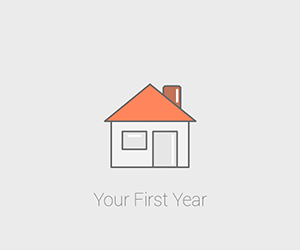
 While thinking about what could go wrong is the last thing you want to do while you’re celebrating your new home, it’s better to be prepared and not need it than vice versa. Even after an inspector has given you the thumbs up on a property, they can’t predict whether something is on the brink of failure or what natural disasters are around the corner.
While thinking about what could go wrong is the last thing you want to do while you’re celebrating your new home, it’s better to be prepared and not need it than vice versa. Even after an inspector has given you the thumbs up on a property, they can’t predict whether something is on the brink of failure or what natural disasters are around the corner.
In case of emergency…
Keep an Emergency Fund
Set aside money to use in case anything breaks or becomes severely damaged.
- Large appliance failure
- Broken water heater
- Broken furnace
- Burst pipes
- Flooding
- Carpet damage
- Leaking windows
Even if your insurance covers repairs, you’ll have to pay for repairs upfront until your claim is processed. Don’t be caught without a backup plan.
Know Your Insurance
Standard homeowners insurance will protect you in the following situations:
- Structural damage – You can re compensated for any damage that happens to the property’s structure including unattached structures (garages, fences, sheds).
- Damage or loss of personal property – If your property within your home (electronics, jewelry, furniture) is damaged or stolen, you will be reimbursed.
- Liability – If you’re sued for something that happened on your property (someone trips on your stairs), your insurance will cover any lawsuits.
- Loss of use – If something happens to your property that makes it unlivable and you need to stay in a hotel or arrange alternate housing, your insurance company will cover expenses.
Additional Coverage
Not all coverage comes standard, so depending on where you live, you’ll need to invest in additional coverage.
- Hazard insurance – Standard insurance will not protect you from earthquakes, floods, hail, windstorms, and war. You can add on hazard insurance if you live in a flood- or earthquake-prone area. Be sure to carefully check your policy for “Named Perils.”)
- Ordinance insurance – If building codes change in your area, you might be required to make updates to your property to ensure they’re up to code. Ordinance insurance will compensate you in case you need to make costly upgrades.
- Extended coverage – Your insurance company will have a number of extended coverage options to further ensure valuables like jewelry and heirlooms, protect items that are stolen from your car, protect boats and RVs, and more. You can talk to them about your needs and what kind of additional coverage would be appropriate for your area.
| << PREVIOUS CHAPTER: Your First Year Home Maintenance Guide | NEXT CHAPTER: How to Thank Your Agent >> |
































